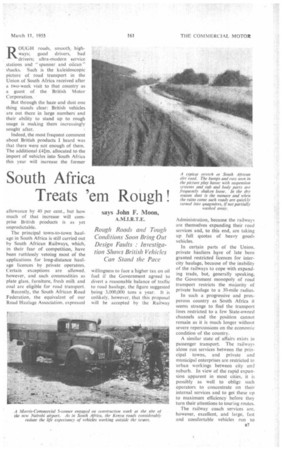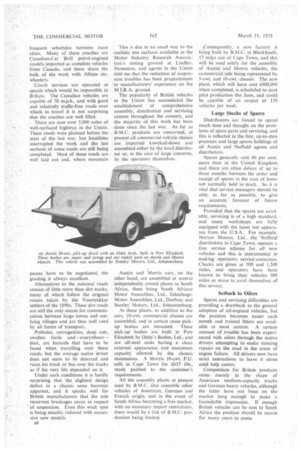South Africa Treats 'em Rough !
Page 41

Page 42

If you've noticed an error in this article please click here to report it so we can fix it.
says John F. Moon, Rough Roads anti Tough Conditions Soon Bring Out Design Faults : Investigation Shows British Vehicles Can Stand the Pace
ROUGH roads, smooth, highways; good drivers, bad drivers; ultra-modern service ,stations and "spanner, and oilcan" shacks. Such is the kaleidoscopic picture of road transport in the Union of South Africa received after a two-week visit to that country as a guest of the British Motor Corporation.
But through the haze and dust one thing stands clear: British vehicles are out there in large numbers and their ability to stand up to rough usage is making them increasingly sought after.
Indeed, the most frequent comment about British products I heard was that there were not enough of them. The additional Sim. allocated to the import of vehicles into South Africa this year will increase the former allowance by 40 per cent., but how much of that increase will comprise British products is as yet unpredictable.
The principal town-to-town haulage in South Africa is still carried out by South African Railways, which, in their fear of competition, have been ruthlessly vetoing most of the applications for long-distance haulage licences by private operators. Certain exceptions are allowed. however, and such commodities as plate glass, furniture, fresh milk and coal are eligible for road transport. Recently, the South African Road Federation, the equivalent of our Road 14aulage Association, expressed willingness to face a higher tax on oil fuel if the Government agreed to divert a reasonable balance of traffic to road haulage, the figure suggested being 3,000,000 tons a year. It is unlikely, however, that this proposal will be accepted by the Railway Administration, because the railways are themselves expanding their road services and, to this end, are taking up full quotas of heavy goods vehicles.
In certain parts of the Union. private hauliers h4ve of late been granted restricted licences for intercity haulage, because of the inability of the railways to cope with expanding trade, but, generally speaking, the Government monopoly of road transport restricts the majority of private haulage to a 30-mite radius.
In such a progressive and prosperous country as South Africa it seems strange to find the transport lines restricted to a few State-owned channels and the position cannot remain as it is much longer without severe repercussions on the economic condition of the country.
A similar state of affairs exists in passenger transport. The railways alone run services between the principal towns, and private and municipal enterprises are restricted to urban workings between city and suburb. In view of the rapid expansion apparent in most cities, it is possibly as well to oblige such operators to concentrate on their internal services and to get these up to maximum efficiency before they turn their attentions to touring routes.
The railway coach services are. however, excellent, and large, fast and comfortable vehicles run to frequent schedules between most cities. Many of these coaches are Canadian-Car Brill petrol-engined models imported as complete vehicles from Canada, and these share the bulk of the work with Albion sixwheelers.
Coach services are operated at speeds which would be impossible in Britain. The Canadian vehicles are capable of 70 m.p.h., and with good and relatively traffic-free roads over which to travel it is not surprising that the coaches are well filled.
There are now over 5,000 miles of well-surfaced highway in the Union. These roads were planned before the start of the last war, but hostilities interrupted the work and the last sections of some roads are still being completed. Most of these roads are well laid out and. where mountain passes have to be negotiated, the grading is always excellent.
Alternatives to the national roads consist of little more than dirt tracks, many of which follow the original routes taken by the Voortrekker settlers of the 1890s. These dirt roads are still the only means for communication between large towns and outlying villages and are thus well used by all forms of transport.
Potholes, corrugations, deep ruts, swollen fords and—everywheredust, are hazards that have to be faced when travelling over these roads, but the average native driver does not seem to be deterred and races his truck or bus over the tracks as if his very life depended on it.
Under such conditions it is hardly surprising that the slightest design defect in a chassis soon becomes apparent, and it speaks well for British manufacturers that the sole recurrent breakages occur in respect of suspension. Even this weak spot is being steadily reduced with successive new models.
138 This is due in no small way to the realistic test surfaces available at the Motor Industry Research Association's testing ground at Lindley. Nuneaton, and agents in the Union told me that the reduction of suspension troubles has been proportionate to manufacturers' experience on the M.I.R.A. ground.
The popularity of British vehicles in the Union has necessitated the establishment of comprehensive assembly, distribution and servicing centres throughout the country, and the majority of this work has been done since the last war. As far as B.M.C. products are concerned, at present all commercial-vehicle chassis are imported knocked-down and assembled either by the local distributor or, in the case of large concerns, by the operators themselves.
Austin and Morris cars, on the other hand, are assembled at several independently owned plants in South Africa, these being South African Motor Assemblies. Ltd., Uttenhage: Motor Assemblies, Ltd., Durban; and Stanley Motors, Ltd., Johannesburg.
At these plants, in addition to the cars, 10-cwt. commercial chassis are assembled, and in certain cases pickup bodies are mounted. These pick-up bodies are built in Port Elizabeth by Oddy's Bodies, Ltd., and are all-steel units having a clean external appearance and maximum capacity allowed by the chassis dimensions. A Morris 10-cwt. P.U. sells in Cape Town for £637 10s., ready painted to the customer's requirements.
All the assembly plants at present used by B.M.C. also assemble other vehicles of American, German and French origin, and in the event of South Africa becoming a free market, with no monetary import restrictions, there would be a risk of B.M.C. production being limited.
Consequently, a new factory is being built by B.M.C. at Blackheath, 17 mites out of Cape Town, and this will be used solely for the assembly of Austinand Morris vehicles, the commercial side being represented by 5-cwt. and 10-cwt. chassis. The new plant, which will have cost £600,000 when completed, is scheduled to start pilot production this June, and could be capable of an output of 150 vehicles per week.
Large Stocks of Spares Distributors are forced to spend much time andthought on the problems of spare parts and servicing, and this is reflected in the fine, up-to-date premises and large spares holdings of all Austin and Nuffield agents and distributors.
Spares generally cost 60 per cent. more than in the United Kingdom and there are often delays of up to three months between the order and receipt of spares in the case of items not normally held in stock. So it is vital that service managers should be able, as far as possible, to give an accurate forecast of future requirements.
Provided that the spares are available, servicing is of a high standard, and many workshops are fully equipped with the latest test apparatus from the U.S.A. For example. Norton Motors, Ltd., the Nuffield distributors in Cape Town, operate a free service scheme for all new vehicles and this is instrumental in making operators service-conscious. Checks are given at 500 and 1.500 miles, and operators have been known to bring their vehicles 300 miles or more to avail themselves of this service.
Setback to Oilers
Spares and servicing difficulties are providing a drawback to the general adoption of oil-engined vehicles, but the position becomes easier each month and trained fitters are available at most centres. A certain amount of trouble has been experienced with oilers through the native drivers attempting to make running repairs on the road in the event of engine failure. All drivers now have strict instructions to leave it alone until help comes.
Competition for British products exists mainly in the shape of American medium-capacity trucks and German heavy vehicles, although the latter have not been on the market long enough to make a formidable impression. If enough British vehicles can be sent to South Africa the position should be secure for many years to come.




























































































